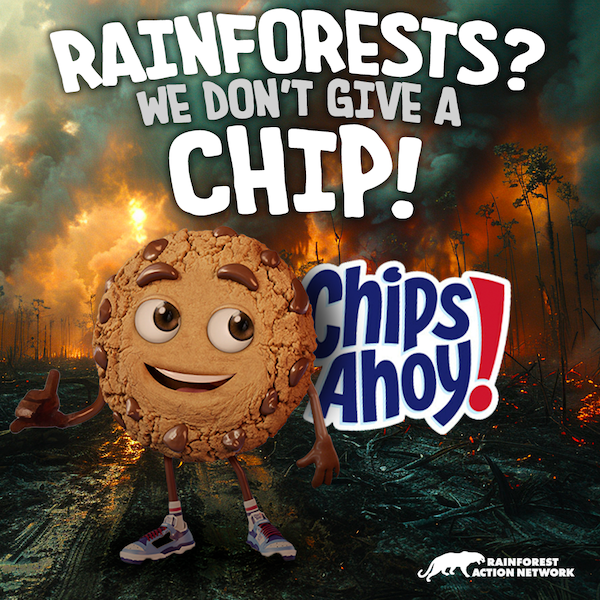Representatives from some of the world’s biggest corporations descended on Mondelēz International’s Chicago headquarters this week for a conference, called Network Effect, focused on sustainability and social impact issues.
Mondelēz, the maker of Oreo and Chips Ahoy!, has made grand gestures toward sustainability and social responsibility in the past, including promises to stop sourcing palm oil and pulp and paper from bad actors. Despite these promises, Mondelēz continues to source product ingredients from businesses tied to deforestation and rights violations.

We attended the conference with a simple message: Mondelēz can’t have a good faith dialogue about sustainability if it refuses to clean up its supply chains, which it can make significant inroads to by eliminating sourcing from unethical producers.
One of those producers is Royal Golden Eagle (RGE), an Indonesian company with a long trail of corruption, deforestation and human rights violations in its wake. Just one of RGE’s subsidiaries, PT Toba Pulp Lestari, has cleared over 4,300 acres of natural forest since it committed to “no deforestation” in 2015. Despite Mondelēz’ promises to end deforestation in its supply chains, it has yet to break ties with RGE.
In the spirit of Mondelēz’ supply chains problems, we showed up to the conference with a billboard truck bearing the messages, “Mondelēz: Advancing Deforestation” and “Oreo: You’re dunked in deforestation.” Attendees were abuzz at the presence of the truck. Conference organizers promptly heightened security and canceled the planned Q&A session at the end. A Mondelēz executive opened the panel by remarking, “People like to say all kinds of things outside of our building.”

The company’s unwillingness to confront its supply chain problems carried through its panel presentation. Mondelēz executives failed to mention their supply chain policies during the conference, instead focusing on the company’s carbon footprint, packaging and food waste, as well as how sustainability-focused marketing can get consumers to open up their wallets more during times of inflation.
Mondelēz’ intransigence on deforestation and human rights issues is why they’ve received a failing grade in our Keep Forests Standing Scorecard for many years — and it’s why we’ll keep showing up to confront them, especially when they attempt to greenwash their environmentally destructive products.
